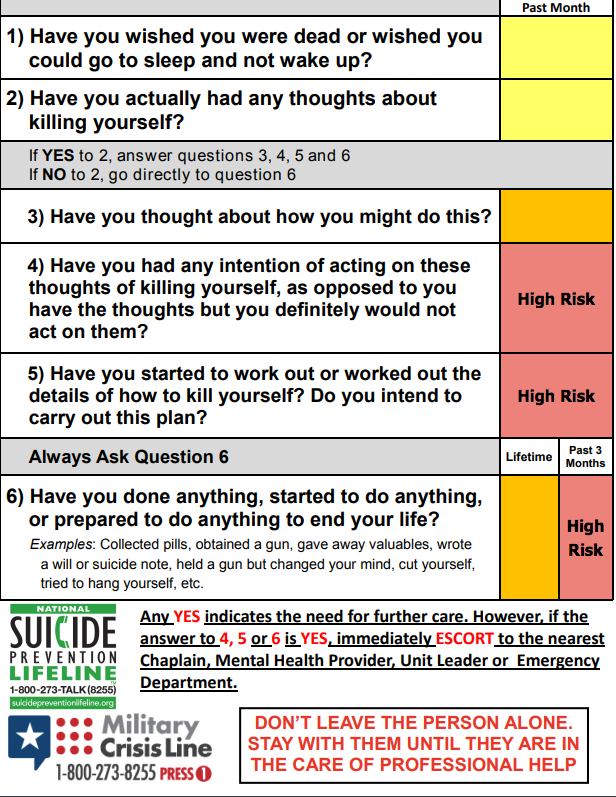Ask. Care. Escort. ACE. You can use this tool if you come across someone who may be experiencing a crisis of suicidal thoughts or behaviors. Using ACE helps determine when someone is at risk for suicide and how to help.
 The Office of Work-Life recently released a public service announcement highlighting ACE, which uses the Columbia Suicide Severity Rating Scale (CSSRS). This technique gives the Coast Guard workforce another tool when it comes to suicide prevention.
The Office of Work-Life recently released a public service announcement highlighting ACE, which uses the Columbia Suicide Severity Rating Scale (CSSRS). This technique gives the Coast Guard workforce another tool when it comes to suicide prevention.
“The intention of the film is to de-stigmatize speaking directly about suicide, and to normalize tender conversations,” said Employee Assistance Program Manager, Christiana Montminy. “The PSA encourages use of the tool, which can effectively guide our prevention efforts by providing the language to use to speak directly, calmly and competently about suicide.”
ACE has long-standing roots in the military community, especially the Army. The Columbia Lighthouse Project has created carry-around cards for all branches of service to use with the CSSRS questions, written as they should be asked.
“ACE is a tool that works,” said Montminy. “You don’t need special training to know how to use ACE, as this tool provides the immediate, directed guidance needed,” she said. “People can take the card out of their breast pockets and have it at the ready. Talking about suicide does not encourage suicide—it allows individuals to get the assistance they need to stay safe”.
Montminy explains that the ACE card is part of the “public health approach”, “where everyone plays a role in building and supporting our network of safety”. If you want additional resources on suicide prevention, you can contact your employee assistance program coordinator, CG SUPRT, or your local chaplain.
If you would like formalized training to develop more intervention skills, ask your Work-Life representative about participating in Applied Suicide Intervention Skills Training (ASIST) or SafeTALK trainings. Remember to print out the ACE card, and practice using it, so you are comfortable with the language.
View the PSA here.
To view the PSA transcript, please click here.
Resource Information Referenced Within the Article:
- To contact the USCG Work-Life staff nearest you, call 1-202-475-5100.
- Locate your nearest Coast Guard Chaplain: 202-372-4900
- National Suicide Prevention Lifeline: 800-273-TALK (8255)
- Coast Guard Support Confidential Counseling and Assistance: 855-CG-SUPRT (247-8778)